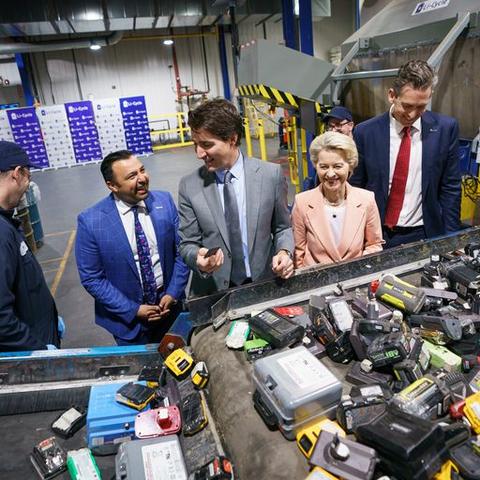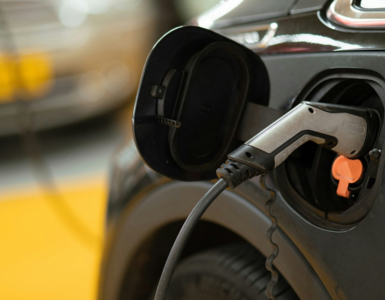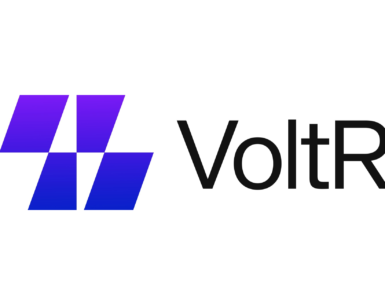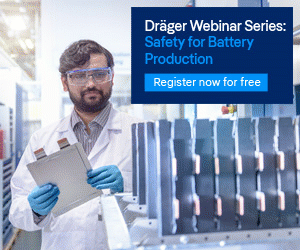Canadian Prime Minister Justin Trudeau and European commission President Ursula Von Der Leyen visit li-cycle lithium-ion battery recycling facility in Ontario.
Li-Cycle Holdings Corp. (NYSE: LICY) (“Li-Cycle” or the “Company”), an industry leader in lithium-ion battery resource recovery and the leading lithium-ion battery recycler in North America, was honoured to host the Prime Minister of Canada, Justin Trudeau, and the President of the European Commission, Ursula von der Leyen, at the Company’s lithium-ion battery recycling facility located in Kingston, Ontario.
During the visit, Prime Minister Trudeau and President von der Leyen were joined by Li-Cycle co-founders Ajay Kochhar and Tim Johnston as they toured Li-Cycle’s first commercial Spoke facility and observed lithium-ion batteries being recycled in a safe and environmentally friendly manner. The leaders discussed the importance of Li-Cycle’s innovative, proprietary and sustainable Spoke & Hub Technologies™, which support the clean energy transition in both North America and Europe.
Ajay Kochhar, co-founder and CEO of Li-Cycle, said:
We are excited to have hosted Prime Minister Trudeau and President von der Leyen at our Ontario Spoke.
“As a Canadian company, we were honoured to have the privilege and opportunity to showcase our innovative and sustainable Spoke technology to Prime Minister Trudeau and President von der Leyen. Li-Cycle plays an essential role in creating a domestic supply of battery materials in Canada and Europe to help further drive electrification.”
Tim Johnston, co-founder and Executive Chairman of Li-Cycle, said:
As Li-Cycle expands upon its significant first mover advantage in the North American market, we continue to advance our global growth strategy and progress with the deployment of our technologies in Europe.
“We believe that Prime Minister Trudeau’s and President von der Leyen’s visit further reinforces Li-Cycle’s exceptional value proposition for Canada’s and Europe’s burgeoning battery supply chain, also as we expect to operationalize our largest Spoke facility to-date in Germany later this year.”
Mark Gerretsen, Member of Parliament for Kingston and the Islands, said:
I’m so pleased that Li-Cycle had the opportunity to showcase their local operations to Prime Minister Trudeau and President von der Leyen during their visit to Kingston.
“A global leader in lithium-ion battery recycling – including those used in EVs – Li-Cycle’s expansion in Kingston is an important part of making Canada a clean tech innovator the world over. Since my initial tour of Li-Cycle’s local facility, I’ve been continually impressed by this company’s innovation and growth,”
Li-Cycle’s patented and proven commercial Spoke & Hub Technologies enables up to a 95% recycling efficiency rate and returns valuable battery-grade materials found within lithium-ion batteries and battery manufacturing scrap into the supply chain.
Additionally, our commitment to sustainability is core to our business of battery recycling and resource recovery, which uses technology to ensure our network of Spoke & Hub operations have an efficient environmental footprint. This includes processes that have minimal solid waste streams to landfill, zero wastewater discharge, and low air emissions.
Li-Cycle’s Spoke Network
Li-Cycle’s Spokes, the first stage of the Company’s vertically-integrated business model, safely recycle battery materials through a proprietary submerged shredding process to produce ‘black mass,’ an intermediate product which contains highly valuable metals, including lithium, nickel and cobalt. Our ‘Generation 3’ Spokes have the capability to directly process full electric vehicle (EV) and energy storage battery packs without any manual dismantling, which enhances safety and cost-effectiveness.
Li-Cycle currently operates four Spokes that can together recycle more than 50,000 tonnes of lithium-ion battery material per year. These Spokes, which are located in Kingston, Ontario; Rochester, New York; Gilbert, Arizona; and Tuscaloosa, Alabama, establish a footprint in key strategic regions to support the recycling needs of its growing battery supply customer base.
Li-Cycle expects to have a total operational processing capacity of more than 80,000 tonnes per year of lithium-ion battery material across its Spoke network in North America and Europe by the end of 2023.
Germany Spoke and European expansion plans
Li-Cycle’s first European Spoke will be located in Germany near the city of Magdeburg and is expected to be the Company’s largest Spoke facility to-date, with a total processing capacity of 30,000 tonnes of lithium-ion battery material per year. The Germany Spoke is expected to have two main lines capable of processing full EV battery packs without dismantling, in addition to ancillary processing capacity, and is scheduled to be operational in the second half of 2023.
Li-Cycle’s Germany Spoke is expected to support its growing customer base in Europe and leverage existing infrastructure with access to clean renewable energy and key transportation outlets. Germany represents the largest market for both battery manufacturing scrap and the expected supply of end-of-life lithium-ion batteries in Europe.
Li-Cycle continues to develop its Norway Spoke, which is located in the city of Moss. To further support the clean energy transition, the Norway Spoke is expected to be powered by clean renewable energy, including geothermal heating. The Norway Spoke, which is expected to have processing capacity of up to 10,000 tonnes per year, is expected to be operational in 2024.
Ontario Spoke and Canadian expansion plans
Li-Cycle’s existing facility in Kingston, Ontario is Li-Cycle’s first Spoke and commenced commercial-scale operations in 2020. Li-Cycle is currently progressing with its plans to develop a new Spoke and warehouse facility in Kingston to replace the existing site, with the initial site work expected to commence in 2023.
Li-Cycle’s new Ontario Spoke will use the Company’s latest ‘Generation 3’ Spoke technology and is expected to have processing capacity of up to 10,000 tonnes of lithium-ion battery material per year, which is double the existing facility’s processing capacity of 5,000 tonnes per year.
The new Ontario Spoke will have the capability to process full EV and energy storage packs without any manual disassembly. The new Ontario Spoke is also expected to have research and training facilities.
Rochester Hub
At Li-Cycle’s Hub facilities, the second stage of its vertically integrated process, Li-Cycle will process black mass to produce battery-grade materials. Li-Cycle’s first commercial Hub facility is under construction in Rochester, New York (the “Rochester Hub”) and is expected to initiate commissioning in late 2023.
The Rochester Hub is expected to create the first source of recycled battery-grade lithium carbonate in North America and is designed to have a processing capacity of 35,000 tonnes of black mass per year, which is equivalent to approximately 90,000 tonnes or 18 gigawatt-hours (GWh) of lithium-ion batteries.
Once fully operational, the Rochester Hub is expected to deliver annual production of 7,500 to 8,500 tonnes of battery-grade lithium carbonate, 42,000 to 48,000 tonnes of battery-grade nickel sulphate, and 6,500 to 7,500 tonnes of battery-grade cobalt sulphate, in addition to other valuable materials.
Li-Cycle recently received a conditional commitment for a loan of $375 million from the U.S. Department of Energy’s Advanced Technology Vehicles Manufacturing program to support the Rochester Hub’s development, providing the Company with financial flexibility to continue executing its global growth plans.
About Li-Cycle Holdings Corp.
Li-Cycle (NYSE: LICY) is on a mission to leverage its innovative Spoke & Hub Technologies™ to provide a customer-centric, end-of-life solution for lithium-ion batteries, while creating a secondary supply of battery-grade materials. Lithium-ion rechargeable batteries are increasingly powering our world in automotive, energy storage, consumer electronics, and other industrial and household applications.
The world needs improved technology and supply chain innovations to better manage battery manufacturing waste and end-of-life batteries and to meet the rapidly growing demand for critical and scarce battery-grade raw materials through a closed-loop solution. For more information, visit https://li-cycle.com/.
Canadian Prime Minister Justin Trudeau and European Commissioner Ursula von der Leyen Visit Li-Cycle’s Lithium-Ion Battery Recycling Facility in Ontario, Toronto, March 8, 2023









